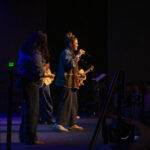Across the many disciplines at California Baptist University, students have the opportunity to develop personally and professionally through curriculum designed with the “Core 4” in mind.
These four student learning outcomes — biblically rooted, globally minded, academically prepared and equipped to serve — prepare students for success after completing a degree. “Equipped to serve” has two major foci: transferring students to a profession and the workplace and implementing a personal and social ethic that results in information participation in multiple levels of the community.
The Office of the Provost provides academic administration and coordination in regard to student learning outcomes.
“Virtually all of the new programs, as I have been writing them, have some kind of field work component in them,” said Dr. DawnEllen Jacobs, vice provost. “…As we get more of the professional majors, it’s a critical component.”
Engineering students are required to take EGR103, En- gineering Service I, a class that requires 30 service hours.
Jenna Cray, freshman engineering major, has completed her required service hours by helping at science fairs for high school and middle school students, proctoring a math competition and other activities in the community.
Ten hours of service not directly related to the math and science are also allowed. Cray said she has used these 10 hours of service mainly at the Calvary Presbyterian Church Hot Meals outreach.
“The entire experience is really important, because they try and stress that engineering itself is a form of service,” Cray said. “That’s the whole point of us having this additional course; so that we make the association in our head that engineers are basically servants to the public. So I think that whole experience and making that connection has its own reward.”
While some service hours are general community outreach and development opportunities, departments try to gear service hours toward professional development, as well.
Dr. Maggie Appenzellar, lec- turer of communication disorders, teaches CDS495, Clinical Practicum. The course requires students to have 126 hours of service.
These hours of practicum are required to receive certification as a speech-language pathology assistant. She said the required service prepares students to enter the job field with a sense of professionalism, responsibility and confidence.
“It gets them to see what therapy really is like and what a job as a speech-language therapist, which a majority of them want to continue to go on to, is really like,” Appenzellar said.
For majors that do not have a specific course devoted to a community service project, Jacobs said the Career Center offers opportunities for students to volunteer in the community.
“These (‘Core 4’) are who we are. We look for these four elements to some degree, in all of our programs,” Jacobs said. “Obviously, all courses won’t, but at some point everything you get in a class we should be teaching with an eye to transferring that into the workplace.”
Matthew Swope contributed to this story.


